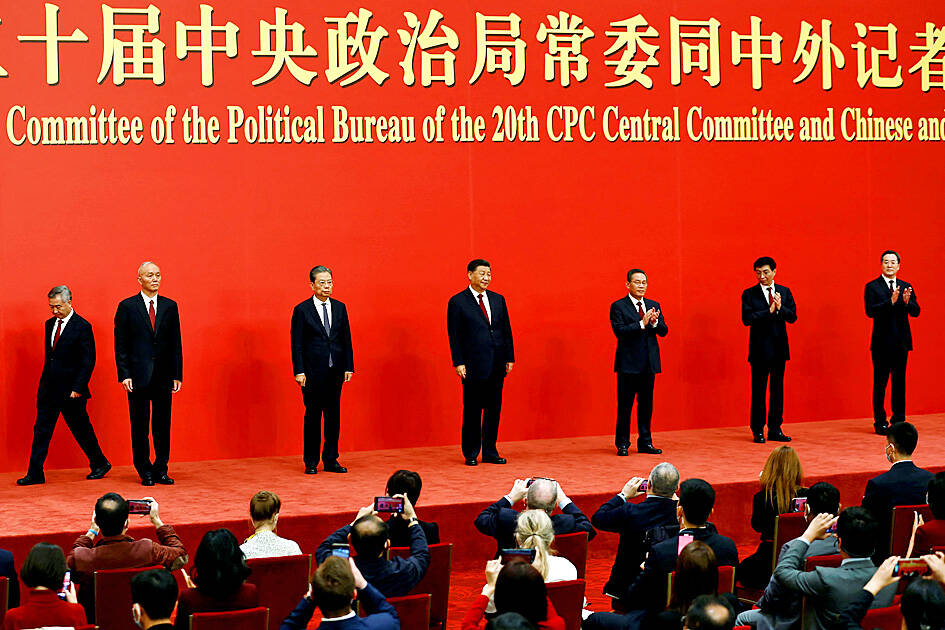The appointment of officials loyal to Chinese President Xi Jinping (習近平) to the Chinese Communist Party’s (CCP) top governing body indicates that Beijing might adopt more hardline policies on Taiwan, with deeper personal involvement by Xi, Taiwanese lawmakers said.
Xi, 69, on Sunday secured an unprecedented third term as CCP general secretary during the party’s National Congress, which also saw the appointment of four of his allies to the seven-member Politburo Standing Committee.
One of the new members is Shanghai CCP Secretary Li Qiang (李強), who served as Xi’s chief of staff during Xi’s tenure as Zhejiang Province party chief.

Photo: Reuters
Li is expected to succeed reform-oriented Chinese Premier Li Keqiang (李克強) in March next year.
Taiwanese lawmakers described the appointments as a bad omen for cross-strait relations.
Democratic Progressive Party Legislator Kuo Kuo-wen (郭國文) said the new lineup shows that “the CCP’s Central Committee has now become ‘Xi central.’”
“Over the next five years, China’s policies on Taiwan will be determined by Xi alone,” Kuo said, adding that Xi’s speech at the congress indicated that his policies are only to become “more hardline and coercive.”
Chinese Nationalist Party (KMT) Legislator William Tseng (曾銘宗) said the CCP has added anti-Taiwan independence language to its constitution, while packing its upper echelons with Xi loyalists.
The changes to the CCP constitution, which were passed on Saturday, commits the party to “resolutely opposing and deterring” Taiwanese independence and “resolutely implementing the policy of one country, two systems.”
The moves show that the CCP’s Taiwan policy would be personally guided by Xi, Tseng said.
The situation is “a little bit dangerous” for Taiwan, whose national security apparatus would have to “carefully evaluate its responses and make sure that it is well prepared,” he added.
Taiwan People’s Party Legislator Jang Chyi-lu (張其祿) said the CCP used the congress to make its “red lines” even clearer, thus reducing the possibility of using ambiguity as a means to reduce cross-strait tensions.
New Power Party (NPP) Legislator Chiu Hsien-chih (邱顯智) said that while the outcomes of Xi’s increased control over the CCP are still unclear, “Taiwan cannot let its guard down.”
For this reason, “the NPP has supported increasing the Ministry of National Defense budget, and reviewing issues related to military training and the length of conscription,” he said.

US President Donald Trump said "it’s up to" Chinese President Xi Jinping (習近平) what China does on Taiwan, but that he would be "very unhappy" with a change in the "status quo," the New York Times said in an interview published yesterday. Xi "considers it to be a part of China, and that’s up to him what he’s going to be doing," Trump told the newspaper on Wednesday. "But I’ve expressed to him that I would be very unhappy if he did that, and I don’t think he’ll do that," he added. "I hope he doesn’t do that." Trump made the comments in

NOT AN OPENING: Trump’s violation of international law does not affect China’s consideration in attacking Taiwan; Beijing lacks capability, not precedent, an official said Taiwanese officials see the US’ capture of the president of Venezuela as a powerful deterrent to Beijing’s aggression and a timely reminder of the US’ ability to defeat militaries equipped with Chinese-made weapons. The strikes that toppled Venezuelan President Nicolas Maduro signaled to authoritarian leaders, including Chinese President Xi Jinping (習近平), US President Donald Trump’s willingness to use military might for international affairs core to US interests, one senior official in Taipei’s security circle said. That reassured Taiwan, the person said. Taipei has also dismissed the idea that Trump’s apparent violation of international law could embolden Beijing, said the official, who was not

A cold surge advisory was today issued for 18 cities and counties across Taiwan, with temperatures of below 10°C forecast during the day and into tonight, the Central Weather Administration (CWA) said. New Taipei City, Taipei, Taoyuan and Hsinchu, Miaoli and Yilan counties are expected to experience sustained temperatures of 10°C or lower, the CWA said. Temperatures are likely to temporarily drop below 10°C in most other areas, except Taitung, Pingtung, Penghu and Lienchiang (Matsu) counties, CWA data showed. The cold weather is being caused by a strong continental cold air mass, combined with radiative cooling, a process in which heat escapes from

Snow this morning fell on Alishan for the first time in seven years, as a strong continental cold air mass sent temperatures plunging across Taiwan, the Central Weather Administration (CWA) said. The Alishan weather station, located at an elevation of about 2,200m in central Taiwan, recorded snowfall from 8:55am to 9:15am, when the temperature dropped to about 1°C, the CWA said. With increased moisture and low temperatures in the high-altitude Alishan area, the conditions were favorable for snow, CWA forecaster Tsai Yi-chi (蔡伊其) said. The last time snow fell at the Alishan weather station was on Jan. 10, 2018, while graupel fell there